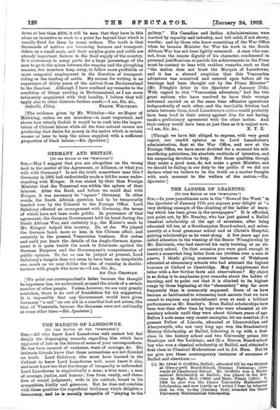THE MARQUIS OF LANSDOWNE.
[TO THE EDITOR OP THE "SPECTATOR."] SIR,—All who know Lord Lansdowne well cannot but feel deeply the disparaging remarks regarding him which have appeared of late in the letters of some of your correspondents. He has been accused of weakness, want of courage, &c. His intimate friends know that these accusations are not founded on truth. Lord Salisbury, who must have learned in the Cabinet to know Lord Lansdowne well, must know it also, and must know too that the charge of incapacity is unfounded. Lord Lansdowne is emphatically a man; a true man ; a man of courage, justice, and honour; free from vanity, and there- fore of sound judgment; wide in his outlook, broad in his sympathies, kindly and generous. But he does not combine with these qualities the superficial brilliancy which delights a democracy, and he is morally incapable of "playing to the gallery." His Canadian and Indian Administrations were marked by capacity and industry, and left solid, if not showy, results ; and by those who know something of the War Office when he became Minister for War his work in the South African War has not been lightly esteemed. A man who can- not, from the innate dignity of his character, condescend to personal justifications or parade his achievements in the Press must be content to bear with reckless remarks, such as that "the nation does not trust the Marquis of Lansdowne, and it has a shrewd suspicion that this Venezuelan adventure was conceived and entered upon before all its bearings had been thought out by the Prime Minister" (Mr. Pringle's letter in the Spectator of January 17th). With regard to this "Venezuelan adventure," had the two great nations who have resolved to have their wrongs redressed carried on at the same time offensive operations independently of each other, and the inevitable friction had arisen between them, Lord Lansdowne's critics would probably have been loud in their outcry against him for not having made a preliminary agreement with the other nation. And their outcry would have been as just then as it is unjust now.
[Though we have felt obliged to express, with very great regret, our candid opinion as to Lord Lansdowne's administration, first at the War Office, and now at the Foreign Office, we have never doubted for a moment his self• sacrificing patriotism, his absolute rectitude of intention, and his unsparing devotion to duty. But these qualities, though they make a good man, do not make a great Minister, and we should be failing in our duty to the public if we did not declare what we believe to be the truth on a matter fraught with such moment to the welfare of the nation.—En. Spectator.]






































 Previous page
Previous page